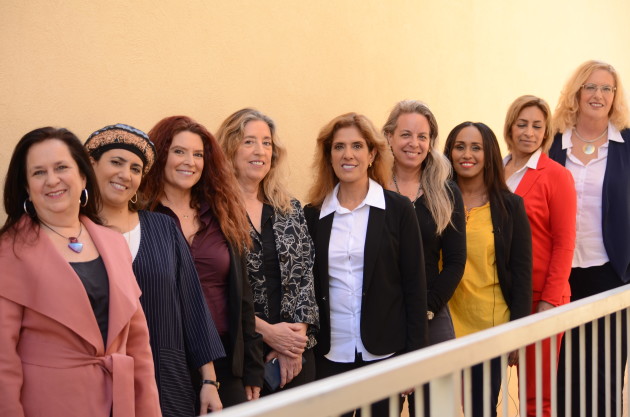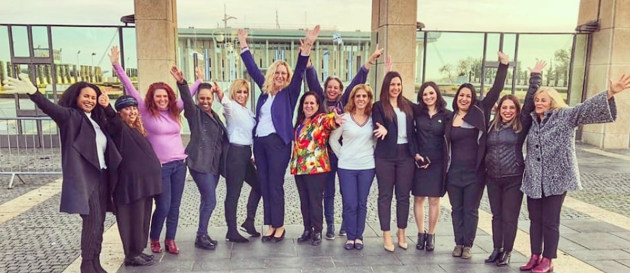
by Elana Sztokman
Why We Started a New Women’s Political Party in Israel

Photo Credit: Efrat Shpruker
Every time I turn on my computer, I remember why I decided to form a women’s political party. Not alone, obviously, but with a diverse and talented group of women. Nevertheless, I am constantly reminded about what brought me here, every time the screen comes to life.
No matter how many ad-blockers I use, the ads are constant: Do I want a hot babe? Or, do I need Viagra? Or maybe I’m in the mood for a Russian bride?
This is annoying not just because of how pervasive sexual objectification is. It’s also jarring because of how many of these bots assume that I am a middle-aged man. It’s a constant reminder that in the world in which we live, men’s needs are constantly being attended to, and women are only useful when we are virtually naked. These two issues are actually connected. I assume that I get these ads because I am an anthropologist who writes frequently about women. Since my Google searches tend to include the word “women”, the spider algorithms assume that I must be a man who wants to have sex with a woman, rather than assume that maybe I just want to find out about interesting women in the world.
The idea that default “consumer” means “men” is as ubiquitous to Google – which, for example in “Google translate” automatically translates into the male form – as it is to so many industries. According to Caroline Criado Perez, author of Invisible Women: Data Bias in a World Designed for Men, most major industries are designed to meet men’s needs, including cars, pharmaceuticals, airplanes, professional uniforms, furniture, and more. The implications are often life threatening – such as cars that test on male crash dummies, protective gear that does not fit women’s bodies, or heart medicines that have the opposite effect on women as men.
Women are literally dying because of assumptions that “people” means “men”
What’s worse, often “citizen” also means “men”. According to Perez, decisions about, for example, transportation are often based on needs of men rather than women – men who tend to dominate the private car binary work-home patterns of transportation, while women dominate the public-transport-dependent “chain travel”. Decisions about health are also based on the “standard” male body, with massive budgets for erectile dysfunction and not pre-menstrual syndrome (even as they can benefit from the same medicines!), not to mention budgets for women’s reproductive needs, sexual assault recovery, or mental health.
These poor decisions are due in large part to the absence of women in decision-making. Where women are missing from a seat around the table, our needs go unmet.
Here in Israel, the glaring absence of women in decision-making has been devastating. The number of women in the Knesset has gone down in the past three parliaments, the number of female cabinet members has not surpassed four (out of 30 or more) in many years, and the number female mayors and regional heads currently stands at a paltry 11 out of 258. Most of the major parties pushed great women out – such as former MKs Dr. Aliza Lavie, Tsipi Livni, and most recently Stav Shafir. Moreover, the issue of gender equality is a non-starter in Israeli politics. None of the major parties is pushing a platform that meets women’s needs.
It’s not looking good for women in Israel. According to the Gender Gap Index of the World Economic Forum, Israel is in 64th place out of 180 countries, DOWN 18 points since last year.
Given the lack of women’s representation, are we surprised that policies do not protect women? The gender pay gap has been a steady 62-64% since the 19080s. The 250 million NIS budget promised in 2016 to combat violence against women has not been transferred. The government’s 2014 commitment to create a National Action Plan on gender equality has not been actualized. And meanwhile, in every area of life, women’s needs are excluded – including peace and security.
Perhaps most significantly, women have been completely absent from the rounds of the failed coalition negotiations, and we are now in a costly, unprecedented political stalemate. Trump’s so-called peace plan pays zero attention to gender and the needs and perspectives of women – which almost guarantees that it will fail.
Studies show that women’s inclusion in decision-making is necessary for lasting peace. Negotiations with diverse teams have a 30% better chance at achieving last solutions, just as companies with women show increased profits. Women bring skills in creative thinking, collaboration, and compassion.
This is why we started the Kol Hanashim Women’s Party in Israel. Because we must insist on women around the table – especially women who understand the value of diversity, inclusion, creativity, humanity, problem-solving, and the mission of the government to meet the needs of ALL its people. This is a vital mission for the future of all of Israel.
Dr. Elana Sztokman, award-winning author, anthropologist, and feminist activist, is the Chair of the new Kol Hanashim women’s party in Israel, and number four on the party list.
The views and opinions expressed in this article are the author’s own and do not necessarily reflect those of Lilith Magazine.
